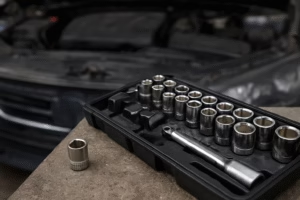So… you skipped your oil change.
You told yourself it was fine. You told your car it was fine. You even told that blinking dashboard light it was being dramatic. But deep down, you knew — this day would come.
Skipping an oil change is like skipping breakfast. You might survive the morning, but eventually you’ll start running on fumes, make bad decisions, and smell weird. Except in this case, it’s your engine doing all the suffering.
Oil: The Lifeblood You Forgot About
Engine oil isn’t just slippery stuff that keeps parts moving. It’s a cleaner, a cooler, and a bodyguard for every bit of metal under your hood. It picks up dirt, metal shavings, and combustion gunk — then carries it to the oil filter like a tiny trash truck.
When you don’t change it, that “trash truck” gets full. Suddenly, your oil isn’t cleaning anymore — it’s spreading the dirt around like a toddler with finger paint.
What Actually Happens When You Skip It
1. Your Engine Turns into a Deep Fryer
Old oil thickens up and loses its ability to absorb heat. The result? Higher temperatures, cooked seals, and the distinct aroma of “financial pain.”
2. Your Fuel Economy Takes a Vacation
When oil breaks down, friction increases. Your engine has to work harder, which means your gas mileage drops faster than your motivation on a Monday.
3. Sludge. Lots of Sludge.
This is the black tar-like stuff that forms when oil gets old. It clogs oil passages, covers moving parts, and makes your engine wheeze like a lifelong smoker.
4. Metal-on-Metal Action (The Bad Kind)
Without proper lubrication, engine parts grind directly against each other. That cute little ticking noise you hear? That’s the sound of your wallet crying.
5. Catastrophic Engine Failure
It doesn’t happen overnight — but it will happen. Bearings seize, pistons score, and before you know it, you’re shopping for an engine instead of groceries.
How Long Can You Actually Stretch an Oil Change?
Every car is different, but here’s a general rule:
- Conventional oil: 5,000 km (or 3,000 miles) max.
- Synthetic oil: 8,000–10,000 km (or up to 6,000 miles).
- “I’ll do it next weekend” oil: Usually followed by an engine rebuild quote.
If you do short drives, drive hard, or live somewhere with extreme temperatures, change your oil a little sooner.
Real Talk: The Cheapest Maintenance You’ll Ever Do
Oil changes aren’t glamorous. No one’s posting “Just changed my oil #Blessed” on Instagram. But at $50–100 every few months, it’s one of the cheapest ways to keep your car alive.
Compare that to a $4,000 engine swap — suddenly, that oil change starts looking like a pretty good deal.
Pro Tip: Check Your Oil Once in a While
Pop the hood, pull the dipstick, and give it a quick look. If it’s dark, thick, or smells burnt, change it. If it’s clean and golden, you’re good.
It takes 30 seconds, and you’ll look like you actually know what you’re doing at the gas station.
The Chenaraa Verdict
Skipping an oil change won’t kill your car today — but it’s like skipping leg day. Keep doing it, and you’ll regret it when things start breaking down.
Do yourself (and your car) a favor — change your oil before your engine files for retirement.
Join Our Automotive Community!
Subscribe to our YouTube channel




